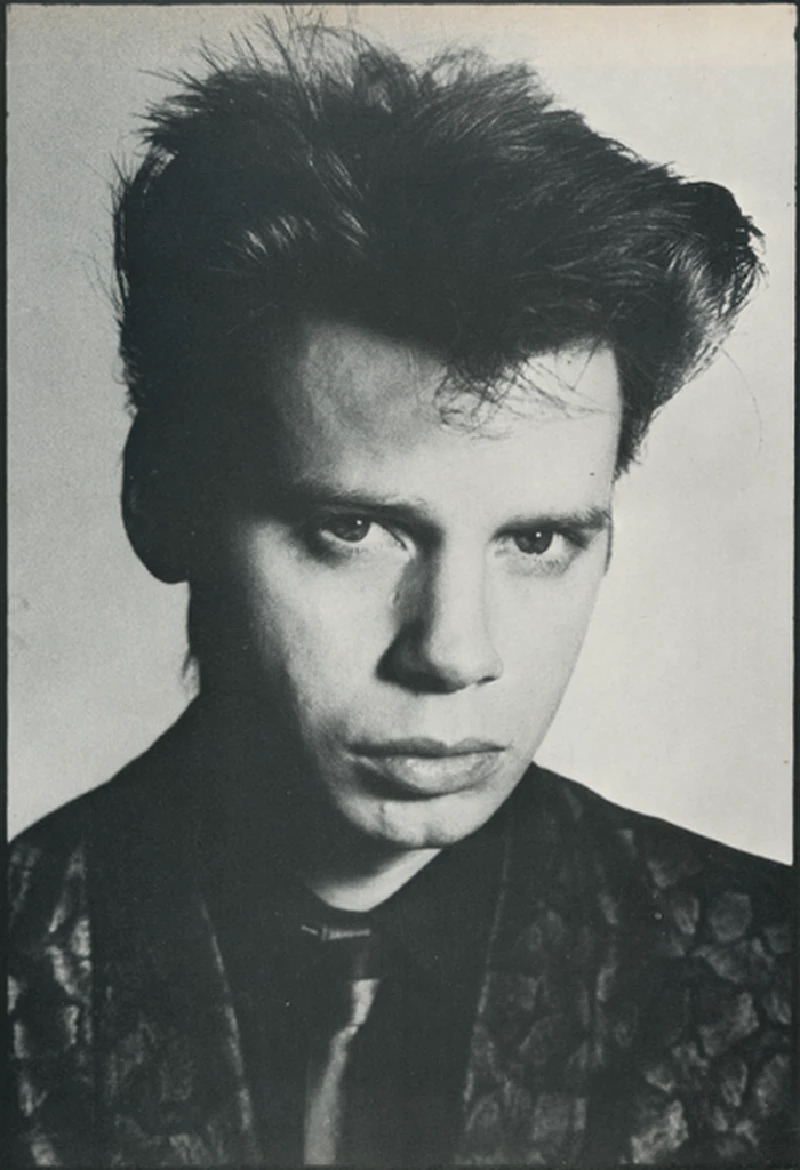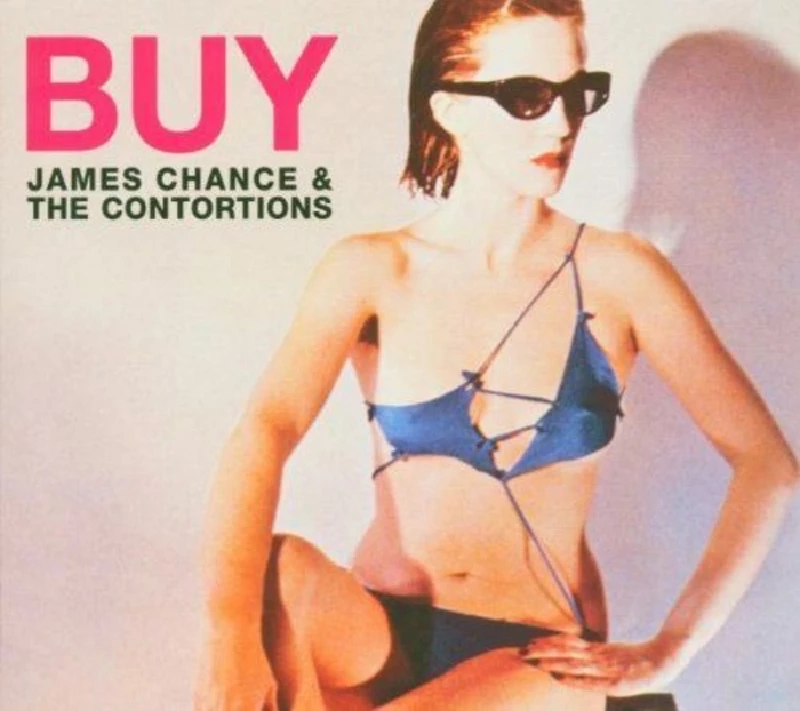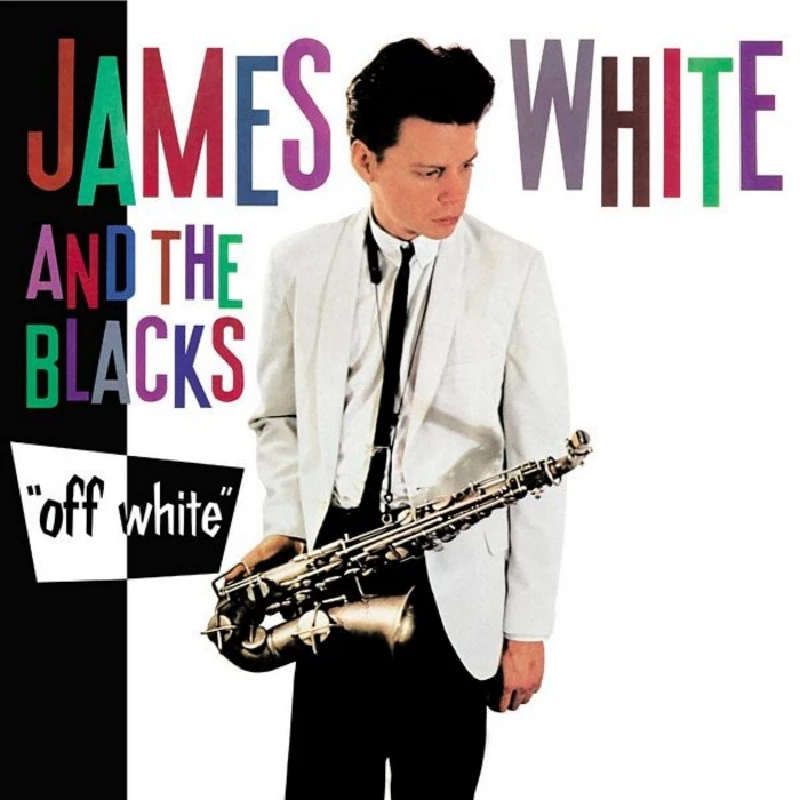James Chance And The Contortions - Profile
by Adrian Janes
published: 8 / 3 / 2016

intro
Adrian Janes examines the early career of New York 'No Wave' musician nad sxaphonist James Chance, and his first two albums, the first 'Buy' with the Contortions, and the second 'Off White' as James White and the Blacks , both of which are about to be reissued with extra tracks
These two reissues constitute the most important parts of the legacy of James Chance. They were not only his first two albums, they were released within months of one another, ‘Off White’ supposedly being his cash-in disco album, recorded at the deluded behest of his label. It’s definitely worth hearing, but it is ‘Buy’ which truly concentrates in one spot the deranged energy and anger of Chance at his unforgiving best. Led by mercurial vocalist/saxophonist Chance, the Contortions were a collision of punk, funk, jazz and art. In this respect, they above all others embodied the key influences on the New York scene of the late 1970s, the ‘No Wave’ that succeeded the New. Contemporaries like Teenage Jesus and the Jerks (who at one time featured both Lydia Lunch and Chance) or Mars were in their own ways as extreme and confrontational, but it’s the Contortions’ greater musicality which has made their legacy last. ‘Buy’, full of nihilistic passion and an utterly unique sound, is why. Opener ‘Design To Kill’ is an uncompromising statement of intent. A solidly funky foundation is bizarrely yet compellingly overlaid with snarling, squealing lines from Chance’s alto sax and notes dragged from Pat Place’s electric slide guitar. In the midst of all this, his voice is in your face, dripping vitriol: “You’re useless/Ain’t got no excuses/You’re designed to kill.“ On an album where love is conspicuous by its absence, ’My Infatuation’ seems born of the torment from the unrequited kind. The rhythm is mainly a basic tom tom thump (though still compulsive in its way), but there’s greater space for Chance’s piercing, rambling sax and Place’s alternately chiming and grinding slide tones to hit home. This being the disco era, ‘I Don’t Want To Be Happy’ fits right in rhythmically, propelled by a classic pattern of hi-hat slices and steady, supple bass. Danceable as it is, from the title onwards it’s clear that Chance isn’t interested in the era’s so-called ‘Good Times’. Instead, it’s his jaundiced view of the human condition (“I don’t wantcha to know me/I don’t think people are very pretty inside”), reinforced by the stinging bursts of Jody Powell’s guitar and Place’s slide swoops. Topping off the mix is Adele Bertei’s bubblegum organ, but in this setting it’s gum that’s been spat on the sidewalk. Chance’s protagonist over the course of the album expresses few emotions beyond rage, contempt and, on ‘Anesthetic’, a sort of tired lust. “You can bite me/But not delight me,” he sneers over moaning sax, before adding what is almost a credo: “For I float above/Whatcha call love”. The album’s centrepiece is ‘Contort Yourself’, a parody of the instructional dance song which doubles as snarled advice on how to cope with life: “First you writhe in position/Then you shatter your frame/Then you stretch your resistance/Until your mind has slipped away”. Chance urges dancers to “Distort your body/And twist your soul”, but this kind of twist is a long way from Chubby Checker. His sax is at its most frantic, but it’s the moment which follows the parodic pattern of “Contort yourself one time” which is key, when on the count of five he unleashes an elongated scream. The band expertly pick up the groove again while Chance continues to lash his larynx, a sound that isn’t the ecstacy often expressed by his hero James Brown but the pain of a release that finds no release. Chance’s withering contempt for the world is briefly turned on himself on the feverish yet controlled funk of ‘Throw Me Away’, before ‘Roving Eye’ restores the jaded status quo. Its ‘Sex Machine’-like groove is skin-tight, studded with sharp guitar from the great Robert Quine, as Chance nonchalantly warns off anyone thinking of deeper commitment: “Don’t bother me/There’s a million of you/If you can’t fake it/Anyone else will do”. But perhaps the affectless front is to mask vulnerability, or at least weariness at maintaining the mask. ‘Throw Me Away’ hints at this possibility, and so does ‘Twice Removed’ (“I’ve been washed out and left to dry”), the music a largely sombre combination of distant sax and restrained rhythm section. Yet Chance’s fury is never far away, with here a brief eruption at the bridge and what sounds like a guitar being periodically choked throughout the song. The frantic finale of ‘Bedroom Athlete’ is one last spurt of scornful lust, the music as ever superbly grounded by most of the band while Place’s slide and Chance’s sax supply a musical mirror to his mania. In Thurston Moore and Byron Coley’s book ‘No Wave’, Chance explains the subsequent metamorphosis of himself and the Contortions into James White & the Blacks: ‘The idea was totally Michael Zilka’s (ZE’s joint owner). He said, “I want you to do a disco album.”…I didn’t take him seriously at first. But I thought, if he’ll give me the money to do it, I’ll come up with something that has a vague relationship to disco and then I’ll do the rest the way I want.’ This is actually quite an accurate summary of what resulted. Tensions between Chance and the band during the recording of ‘Buy’ led to even more egocentric control on the one hand and walk-outs on the other. There is certainly a more fragmented feel to ‘Off White’, accentuated by the range of guest vocalists and musicians and the split (clearer on the original vinyl) between songs and instrumentals. It leads off with two further versions of ‘Contort Yourself’. Compared to the one from ‘Buy’ the first, a remix by August Darnell, is on the level of a dull demo, almost entirely devoid of the energy it needs - even Chance sounds muted. The second picks up the emotional pace, but rather than a radical reinterpretation it too feels more like an earlier stab at the song, and that on ‘Buy’ remains its true realisation. One aspect where ‘Off White’ does trump ‘Buy’ is a sense of humour that’s as warped as vinyl left out by a loft window in a New York summer. ‘Stained Sheets’ reunites James with his erstwhile Teenage Jesus bandmate Lydia on a phone sex number where for once she is literally lost for words but still manages to communicate her desire: a track that is truly out to Lunch. A cover of Irving Berlin’s ‘Heat Wave’ is sung pretty much straight by Kristian Hoffman and Anya Phillips (Chance’s manager and lover), but amusingly undercut by Pat Place’s slide periodically ballooning out of the mix and, by the end, Chance’s inability to resist dragging the song out of the urbane Thirties into the free jazz Fifties. Undoubtedly the album’s most provocative song is ‘Almost Black’. Musically tight, its entwined saxes emitting a sinuous jazz riff, the spoken lyrics are an angry, sarcastic dialogue between a white and a black woman over the racial credentials of the kind of black-aspiring white hipster Chance (or someone like him) embodied then and who is still a type today. It’s a paradox summed up in their opening exchange: “Well, he’s almost black/That nigger’s white”, and continues with further assaults on his authenticity (“He’s got no soul”, “He don’t have roots”), accusations that Chance may well have faced on his initial efforts to break into the jazz world. But with the unmistakable sound he formulated, it seems clear that Chance’s take on black musicians, from Ornette Coleman to George Clinton, was one of appreciation and inspiration rather than appropriation. To add to the track’s conceptual melee, the ‘white’ woman here is Anya Phillips (actually Asian-American) who purrs “He makes me feel high-toned all night” (i.e. with the kind of skin colour that lets a black person ‘pass’ for white), while the black voice is credited to the white Adele Bertei. If that credit is correct she certainly achieves an astonishingly authentic-sounding tone, adding a further layer of unresolved confusion. In the end it’s a song, it can’t answer any questions, but heard now in a world even more agitated about racism, diversity and cultural appropriation, it has an undiminished power to make both brain and body dance. ‘White Savages’ begins a sequence of instrumentals, and is the crazed best of them. Don Christensen’s frantic disco beat is like that of a palpitating heart beneath the rest of the Blacks all contorting their instruments into new grotesque shapes. ‘Almost Black (Part Two)’ culminates in a Robert Quine solo that sounds as if the guitar is protesting at what he is making it produce. Forget Studio 54: the best studio for music like this would be Francis Bacon’s. Both albums have bonus tracks, mainly live recordings. The particular interest of those on ‘Buy’ is that it’s still the original Contortions in full fiery flow, whereas by the 1980 Rotterdam gig sampled on ‘Off White’ Chance is already operating with a completely different band. No doubt these were more ‘proper’ musicians. But the highly competent yet still rough-edged Contortions were surely the best vehicle for Chance’s vision. The nine songs of the 1979 original create a peerless world where strange musical combinations make warped sense. Their bitter wit and adventurous musicianship make ‘Buy’, for my money, a truly great album for its time and any time.
Band Links:-
http://jameschanceofficial.blogspot.co.uk/https://www.facebook.com/JamesChanceOfficial
https://twitter.com/jccontortions
Picture Gallery:-


most viewed articles
current edition
Carl Ewens - David Bowie 1964 to 1982 On Track: Every Album, Every SongArmory Show - Interview with Richard Jobson
John McKay - Interview
Colin Blunstone - Thalia Hall, Chicago, 16/7/2025
Bathers - Photoscapes 1
Billie Eilish - O2 Arena, London, 10/7/2025
Loft - Interview
Visor Fest - Valencia, Spain, 26/9/2025...27/9/2025
Sir Tim Rice - Interview
Robert Forster - Interview
previous editions
Manic Street Preachers - (Gig of a Lifetime) Millennium Stadium, Cardiff, December 1999Heavenly - P.U.N.K. Girl EP
Beautiful South - Ten Songs That Made Me Love...
Peter Perrett - In Dreams Begin Responsibilities Interview Part One
Boomtown Rats - Ten Songs That Made Me Love....
Oasis - Oasis, Earl's Court, London, 1995
Trudie Myerscough-Harris - Interview
Coldplay - Wembley Arena. London, 16/8/2022
Prolapse - Interview
Pixies - Ten Songs That Made Me Love...
most viewed reviews
current edition
Davey Woodward - Mumbo in the JumboSick Man of Europe - The Sick Man of Europe
Lucy Spraggan - Other Sides of the Moon
Amy Macdonald - Is This What You've Been Waiting For?
Blueboy - 2
Suzanne Vega - Flying With Angels
Bush - I Beat Loneliness
Phew, Erika Kobayashi,, Dieter Moebius - Radium Girls
Alice Cooper - The Revenge of Alice Cooper
Cynthia Erivo - I Forgive You
Pennyblackmusic Regular Contributors
Adrian Janes
Amanda J. Window
Andrew Twambley
Anthony Dhanendran
Benjamin Howarth
Cila Warncke
Daniel Cressey
Darren Aston
Dastardly
Dave Goodwin
Denzil Watson
Dominic B. Simpson
Eoghan Lyng
Fiona Hutchings
Harry Sherriff
Helen Tipping
Jamie Rowland
John Clarkson
Julie Cruickshank
Kimberly Bright
Lisa Torem
Maarten Schiethart